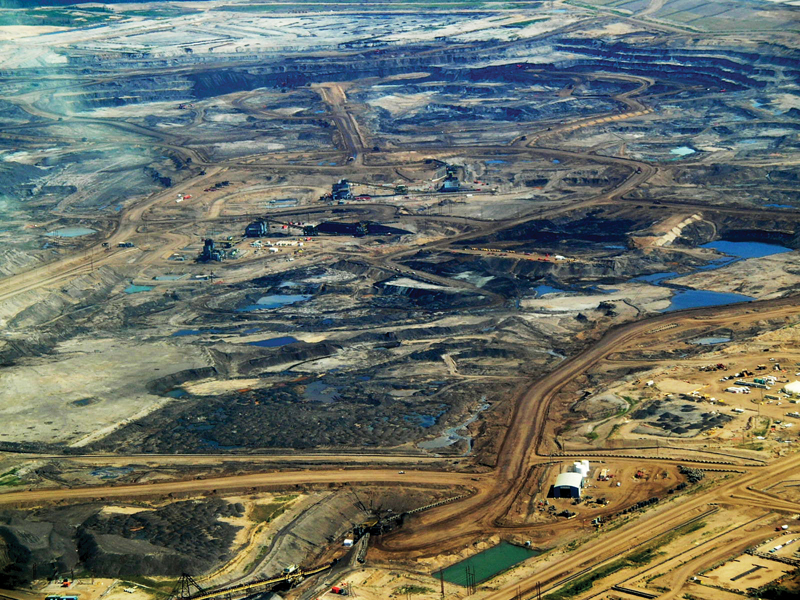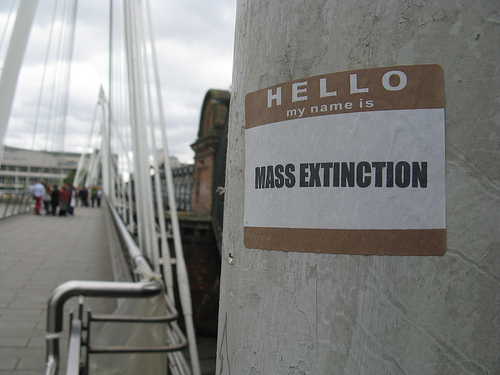Why is the religious world quiet on the XL Pipeline debate?
Editorial note: This post was previously published on Saturday, March 22. On Sunday morning, March 23, the post was deleted due to a technical error. Unfortunately, all of the reader’s comments were also deleted at this time. We are working to restore those comments. For more details and summaries of the comments please check the note at the end of the post.
***
As Catholics, we are likely aware of statements that have emerged from the USCCB about our need to act as stewards for creation (for instance,, this classic from the early 1990’s). As a Jesuit, I have seen similar statements emerge from our own leadership. Yet, for the most part, as a body, we Catholics tend to remain silent on environmental issues.
I think of these official Catholic statements in light of a friend’s recent post on Facebook. The message was simple: if you are not aware of what is happening in Nebraska with the Keystone XL pipeline right now, you have failed in your civic duty. Now, hyperbole tends to be a common thing on Facebook. The problem is that these are the words of a reasonable person who has nothing to gain by making this statement. The truth is, even if we are educated about what is going on with the Keystone XL, we might be at a loss even to begin recognizing what is at stake.
The story: Canada has oil and it wants to sell it. The “oil” is actually found in a layer of shale about a mile beneath the earth’s surface. When it is extracted, it is in the form of bitumen, and this substance must be refined. In order to get the bitumen from Canada to refineries in Texas the pipeline must cross a national boundary, pass through a couple of states, a NativeAmerican reservation, a national wildlife reserve and over one of the largest aquifers in the world (an aquifer is a giant store of fresh water that people use as drinking water and to irrigate their farmland).
The problem: The extraction process (called “fracking”) releases toxic elements into the air, water and soil. The refinement process for the bitumen extracted from the Tar Sands releases more toxic elements into the air, water and soil. Finally, the finished product will eventually be burned as fuel which, of course, releases more toxic elements into the air, water and soil. In short, carbon pollution has already had a lasting impact on the environment; at current levels it will impact the environment in a way that makes the prospect of future life, even one hundred years into the future, questionable. At least according to various government websites (including the EPA, NASA, and NOAA), these dangers are public knowledge. Fracking contributes to this desolating outlook because of the amount of carbon it promises to release into the air. The pipeline is just the vehicle that makes the process profitable.
What happened: While permission to build the pipeline through Nebraska had at one point almost been secured, it met strong, organized opposition from the state’s citizens. Protesters there are worried because past history indicates that it is not a matter of “If” the pipeline will leak, but “when and where” the pipeline will leak. From the Deepwater Horizon disaster to more recent fracking-related disasster-accounts of land being destroyed and drinking water being contaminated for thousands of people in Pennsylvania, Virginia, Ohio and Texas. In these cases, land, air and water were damaged and oil companies failed to make adequate reparations for their mistake. People in Nebraska are attempting to stop this cycle, and perhaps draw attention to the process of fracking, our continued oil dependency, and what it reveals about our habits of consumption.
Where are we now: The Keystone XL has been halted for the time being. Some of Nebraska’s elected officials tried to manipulate the law in order to allow the pipeline to go through privately owned land and a national reserve. Permission was initially granted, but the people took the government to court. It turned out that the provisions that were created to allow for the pipeline to be built were actually illegal. Still, the US government may step in and force the people of Nebraska to accept the pipeline. The standard argument is that the XL pipeline is necessary because the bitumen is already coming out and it must be refined. There are already many other pipelines that are up and running. Yes. Not only would the Keystone XL merely be an extension of an already existing pipeline that moves through a different part of that state, but other pipelines, in other parts of our country, already have been approved and are under construction. Ultimately, the general consensus is that while fracking is a flawed process, we need oil, the oil will come out anyway, and pipelines will be the way to make it happen.
Sadly, when we talk about fracking and pipelines, we are not merely talking about achieving “energy independence.” We are talking about a process that only exists because we have already burned through our larger supplies of “cleaner” oil. We are not just talking about an entire economy that is showing signs of falling apart for reasons specifically related to our consumer practices and abuse of the environment. We are talking about our failure to act as stewards of resources and recognize the significance of what we are doing to the Earth and her inhabitants. This is a moral issue that extends far beyond Keystone XL. By continuing to allow our consumption to go unchecked we are slowly destroying the environment in which we live and we are killing ourselves in the process.
So, back to the main question: why is the religious world silent about this? Is it because we do not want to pick sides? Is it because we do not recognize what is occurring with the pipeline? Is it because we do not see the bigger picture? Is it because we do not see this as being in line with our mission to act as stewards of creation? Is it because we do not think that religion has any place in economic, political, or environmental issues? Is it because we do not know where to stand, or because we do not want to upset people who have money and power? Is it because we do not want to seem like fools who believe that we are actually poisoning our world to the point where entire species of plants and animals are going extinct? Is it because we do not want to face the realization that we actually have responsibility to address this problem, that this will not go away, and that we are standing on the brink what could be a tipping point towards the decline of humanity?
At any rate, I am curious to hear your thoughts.
_____________________________________________
Photo 1 – “tar sands, Alberta” by Dru Oja Jay and Dominion, of Howl Arts Collective. Found on flickr; used under creative commons.
Photo 2 – “Goodbye” by Kevan Davis. Found on flicker; used under creative commons.
Deleted Comment Summary
There were several remarks by readers that warranted serious consideration. The first commented that the Roman Catholic Church had failed to address these concerns because it was primarily concerned with addressing issues such as abortion, contraception, and gay marriage. A second comment remarked that as long as the Catholic Church was primarily concerned with self-preservation (protecting clergy and keeping their donors happy) it could not find a relevant voice in the environmental debate. Another key comment pointed out a fundamental error of this piece in that the author had conflated the practices of hydraulic fracturing (commonly called fracking) with in situ techniques (such as Solvent Extraction and Toe to Heel Air Injection) used at the Alberta Tar Sands location; that if this was the amount of knowledge most religious people had about these techniques, they should remain quiet; and that the commentator had, in fact, had these discussion with members in his/her church, had found that fracking was a favorable practice, but had also made a decision not to speak publicly as a member of his/her church because religion and politics should remain separate. Finally, there was a 12 point comment on the problems with the development of the Alberta Tar Sands project. All attempts have been made to reprint the article as it first appeared with the exception of some of the links and the sentence in the fourth paragraph naming the government sources for information about carbon pollution and climate change (EPA, NASA and NOAA). Our apologies for this mistake; may we continue the conversation in good faith.














